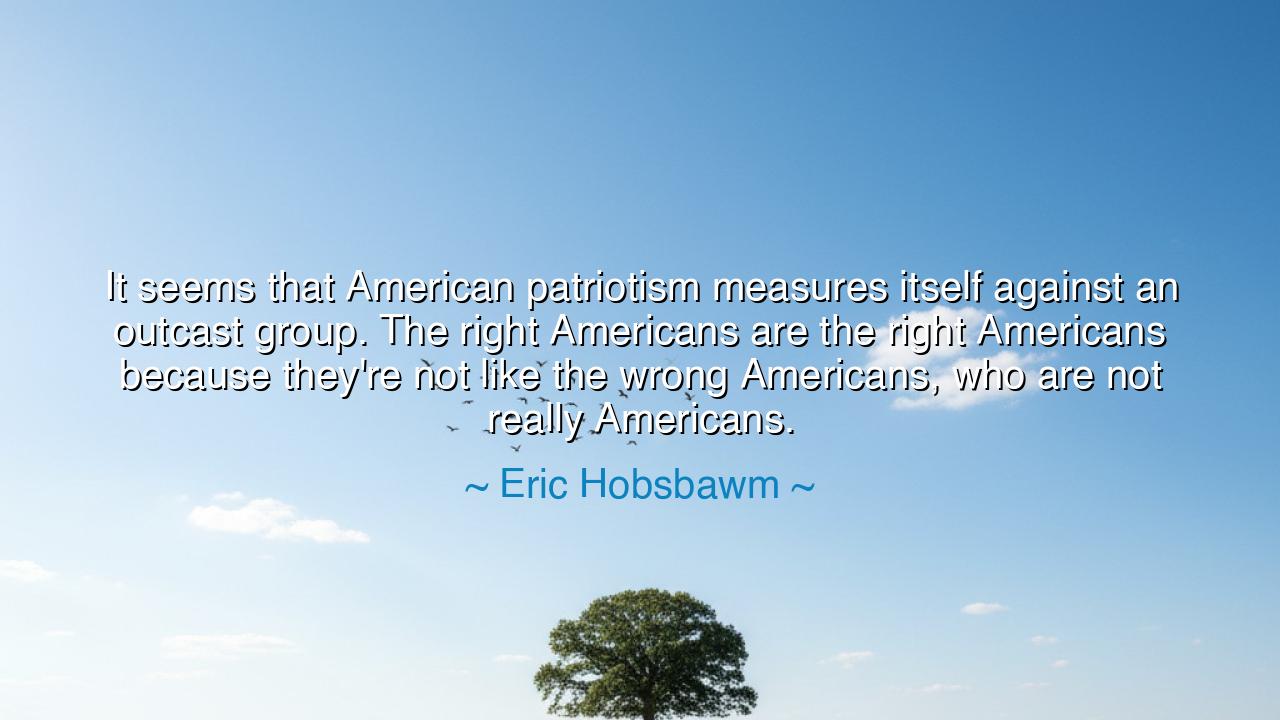
It seems that American patriotism measures itself against an
It seems that American patriotism measures itself against an outcast group. The right Americans are the right Americans because they're not like the wrong Americans, who are not really Americans.






The words of Eric Hobsbawm—“It seems that American patriotism measures itself against an outcast group. The right Americans are the right Americans because they're not like the wrong Americans, who are not really Americans.”—strike like a mirror held before the soul of a nation. In these words, the historian unmasks a dangerous truth: that too often, loyalty to one’s country is defined not by love of its people, but by exclusion of those who are deemed unworthy. Such a vision of patriotism does not build unity; it thrives by division, by drawing a line between “us” and “them,” by creating outcasts within one’s own borders.
The ancients knew well the peril of such thinking. In the city-states of Greece, citizenship was exalted, but only for a few—women, slaves, and foreigners were denied the rights of belonging. Their identity as Athenians or Spartans was built upon the exclusion of others. This kind of patriotism—defined against an “outcast” group—brings pride to some but chains to others. Hobsbawm reminds us that when a nation chooses to measure its worth by the rejection of its own, it builds its strength upon a fragile and poisoned foundation.
History in America shows this pattern clearly. During the Red Scare of the 1950s, suspicion and fear defined who was a “true American” and who was not. Those accused of communist sympathies—writers, actors, teachers—were cast out, blacklisted, and silenced. Their loyalty was questioned not because of proven treachery, but because the nation sought to prove its own purity by creating “wrong Americans.” This patriotism of exclusion weakened the fabric of freedom it claimed to protect, for it measured loyalty not by devotion to liberty, but by conformity to fear.
Another example lies in the long shadow of race. For centuries, African Americans were denied recognition as “true Americans,” even while they bled and died in wars for the republic. Segregation, discrimination, and exclusion declared them “not really Americans,” while others proclaimed themselves “right Americans” by contrast. And yet, in every age, Black voices and leaders reminded the nation that true patriotism is not exclusion, but the struggle to make the nation’s ideals real for all its people. Martin Luther King Jr., in his dream, called America back to the deeper meaning of its creed: that liberty and justice must be for all.
The meaning of Hobsbawm’s words, then, is not only a critique but a warning. When patriotism is defined by who is cast out, it becomes a weapon rather than a virtue. It binds the identity of the people to hostility, creating endless enemies within. Such patriotism is fragile, for the moment one group is no longer convenient to exclude, another must be found. The true strength of a nation lies not in this endless cycle of division, but in recognizing the dignity of all who belong to it.
The lesson is clear: let not your loyalty to your country be built on the rejection of your neighbor. True patriotism is not about proving who is “wrong” and who is “right,” but about building together toward justice, freedom, and peace. If you must measure yourself as a citizen, measure yourself not against the outcast, but against the ideals of your land—do you serve justice? Do you uplift others? Do you honor truth? This is the measure that endures.
Practical action flows from this wisdom. When you hear voices declaring that some citizens are “not real Americans,” or “not true patriots,” stand against such exclusion. Welcome difference as part of the nation’s strength. Honor those who work for justice, even when they dissent, for dissent itself can be an act of loyalty. In your daily life, refuse to let others be cast out by prejudice or fear. By doing so, you live the deeper truth: that a nation is strongest not when it divides itself, but when it embraces all its people as its own.
Thus, Hobsbawm’s words endure as a teaching for every age: beware the patriotism that thrives by creating outcasts. For the nation that builds its unity upon division builds upon sand, but the nation that embraces all who belong will stand firm upon the rock of justice.






AAdministratorAdministrator
Welcome, honored guests. Please leave a comment, we will respond soon